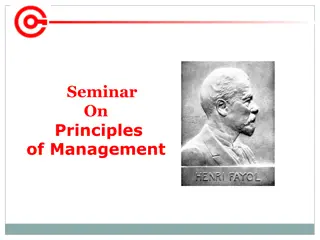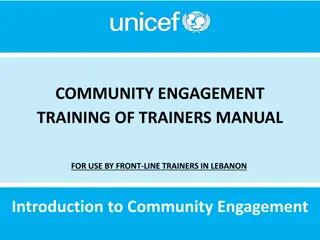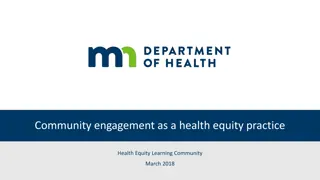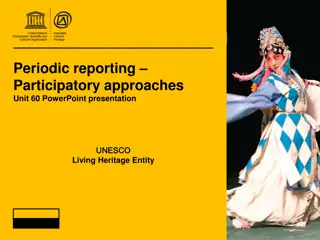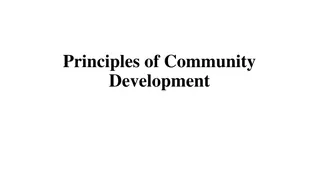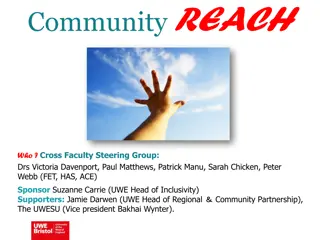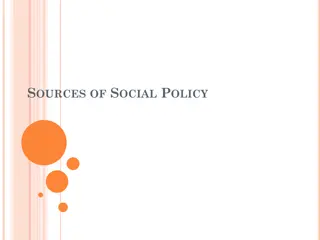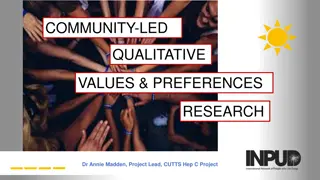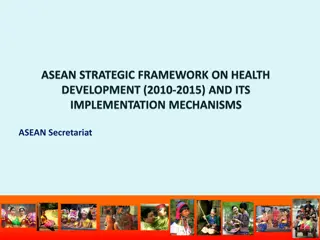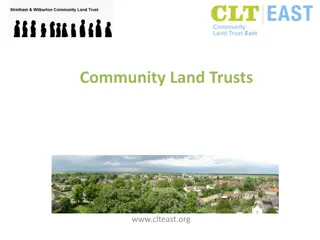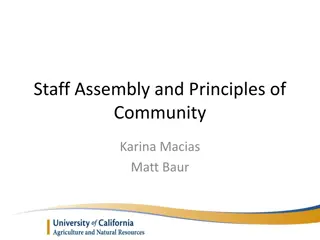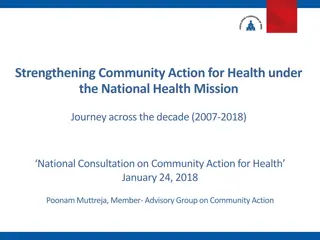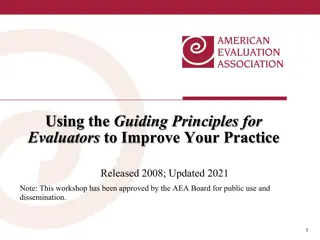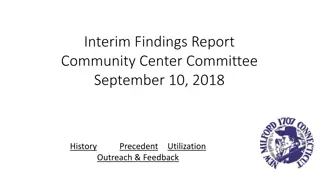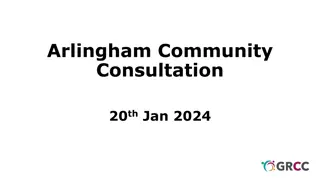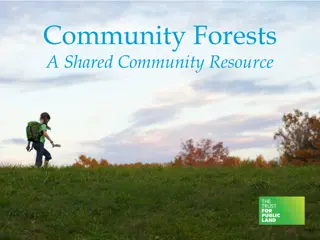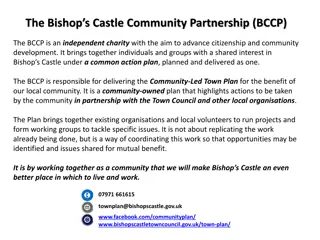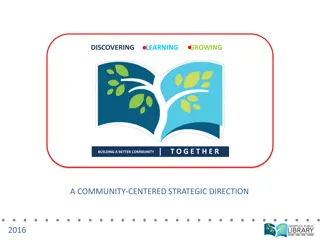Community Policing Division
The North End Tacoma Community Policing Division operates with the aim of coordinating proactive policing efforts with citizens to ensure safety and security in the community. Led by Captain Christopher Travis, the division comprises two lieutenants, an administrative lieutenant, 16 Community Liaiso
2 views • 40 slides
Principles of the Ghana Civil Service Code of Conduct
The Code of Conduct for the Ghana Civil Service, outlined by Elizabeth Obeng-Yeboah, emphasizes principles such as abiding by the constitution and laws with dignity, integrity, and professionalism. It sets standards for conduct, avoiding conflicts of interest, maintaining political neutrality, and u
1 views • 34 slides
Guidelines for Selection of Unskilled Workforce in Gulf of Guinea Northern Regions Social Cohesion Project
This draft trainer's manual outlines the purpose and structure of the manual designed for providing capacity building training to community structures involved in the Gulf of Guinea Northern Regions Social Cohesion (SOCO) Project. The manual aims to enhance the effectiveness of community-level train
0 views • 16 slides
University of Toledo Office of Community Engagement and Strategic Partnerships Presentation
Ms. Valerie Simmons-Walston, Special Advisor for Community Engagement and Strategic Partnerships, presents the University of Toledo's commitment to community engagement, its core values, and President Postel's vision for adapting and evolving to positively impact students, faculty, staff, and the co
4 views • 19 slides
Community Health Needs Assessment in Victoria: A Focus on Social Determinants
This project focuses on conducting a health needs assessment in a specific community in Victoria, addressing a significant public health concern within the community. It discusses the social risk factors contributing to the chosen issue, policies, community resources, and the nurse's role in improvi
6 views • 8 slides
Academic Freedom and Shared Governance in Higher Education
Academic Freedom and Shared Governance are foundational principles advocated by the American Association of University Professors (AAUP) to ensure educators have the freedom to explore, research, teach, and discuss without censorship. These principles empower educators to enhance student learning an
0 views • 9 slides
Essential Principles of Management Discussed in Seminar
Explore the foundational principles of management discussed in a seminar on principles of management. Delve into topics such as division of work, authority, discipline, unity of command, and unity of direction as outlined by Henri Fayol. Gain insights into the importance of these principles for effe
0 views • 22 slides
Community Engagement Training of Trainers Manual for Front-line Trainers in Lebanon
This manual introduces the concept of community engagement, defining what a community is and highlighting its importance. It explores a case study where active community members address health issues through community engagement. The manual emphasizes community-driven development, involvement in dec
0 views • 19 slides
International Law of War: Nuremberg Principles and Accountability
The Nuremberg Principles, derived from the trials of Nazi officials for war crimes, establish accountability in international law. These principles hold individuals responsible for committing acts considered crimes under international law, regardless of their position or orders received. The assumpt
2 views • 22 slides
Promoting Ethical Principles in Social Science Research
Explore the challenges and strategies for translating and applying ethical principles, especially in emergency contexts. Learn key questions in social science research and how to ensure information contributes to community actions. Understand the importance of considering ethical principles in all w
0 views • 21 slides
Principles of Authentic Community Engagement for Health Equity
Explore the practice of community engagement in promoting health equity through authentic engagement principles. Discover how shifting from doing things for communities to doing things with communities can lead to impactful outcomes. Learn about asset-based approaches and ways to strengthen communit
0 views • 10 slides
Unlocking the Potential: Benefits of Community Schools
Community schools are neighborhood hubs that offer not only academic education but also various services to support the whole child and the entire community. By addressing obstacles like hunger, health issues, and family instability, community schools improve graduation rates, student performance, a
0 views • 12 slides
Community Engagement in Safeguarding Intangible Cultural Heritage
Encouraging community participation, involving various stakeholders, and prioritizing ethical principles are essential in safeguarding intangible cultural heritage. This presentation explores different interests, roles, and areas of expertise, emphasizing the importance of engaging non-governmental
0 views • 20 slides
Study Guide for Principles of Management Course at Africa Research University (ARU)
Welcome to Africa Research University (ARU)! This study guide is designed to help you navigate through the Principles of Management course (Course Code: PRM4) at ARU. It provides an introduction to the course content, emphasizing the importance of developing management skills to effectively lead and
1 views • 40 slides
Key Principles of Insurance Explained with Visuals
Understanding the principles of insurance is crucial for both insurance seekers and companies. The principles include Utmost Good Faith, Insurable Interest, Indemnity, Contribution, and Subrogation. These principles ensure transparency, fairness, and protection for policyholders. Visual representati
0 views • 6 slides
Key Principles of Community Development
The principles of community development emphasize the recognition of community members' dignity, active participation, self-help, self-determination, and addressing felt needs. These principles stress the importance of respecting the community's resources, involving community members in decision-mak
2 views • 10 slides
Principles of Training: Overload, Specificity, and Progression
Principles of training encompass overload, specificity, and progression. Overload requires doing more than usual, specificity involves tailored activities, and progression ensures gradual advancement. These principles are vital for improving fitness levels safely and effectively, emphasizing the nee
8 views • 17 slides
Empowering Communities Through START: The Heart of Your Community
Discover the core principles of START - The Heart of Your Community, emphasizing the importance of belonging, connection, and community support. Explore how the START approach in Westfield fosters collaboration, harnesses local skills and resources, and creates a stronger, more connected community t
0 views • 10 slides
Community REACH: Connecting UWE Students with Bristol Communities
Community REACH is a project aimed at promoting connections between UWE students and community groups in Bristol areas with historically low higher education participation. Through collaborative events and partnerships, the project seeks to raise awareness of UWE as an inclusive university, engaging
0 views • 7 slides
Effective Partnership and Mutual Accountability in Nutrition Clusters
The content discusses the minimum commitments needed for participation in Nutrition Clusters, explains the Principles of Partnership, and explores how these principles can enhance coordination and accountability to affected populations. It emphasizes partner commitments, such as leadership, mainstre
0 views • 7 slides
Overview of Fundamental Principles of Space Law and Outer Space Treaties
The content discusses the fundamental principles of space law highlighted at the United Nations Space Law Conference 2020, focusing on key treaties such as the Outer Space Treaty of 1967 and associated rights, duties, and obligations of states in space exploration and use, including non-appropriatio
0 views • 16 slides
Overview of Directive Principles of State Policy in Indian Constitution
Directive Principles of State Policy (DPSP) in the Indian Constitution encompass social, economic, and political programs aimed at realizing ideals of justice, liberty, equality, and fraternity. They are non-justiciable but guide the state in legislative matters. Classified into Socialistic, Gandhia
0 views • 24 slides
Community-Led Qualitative Research on LDSS/N Distribution Preferences
Dr. Annie Madden leads a community-led research project focused on the values and preferences of people who inject drugs regarding LDSS/N distribution. The study aims to generate evidence on the feasibility and impact of implementing LDSS/N distribution programs, involving phases from pre-implementa
0 views • 8 slides
Overview of ASEAN Transformation and Objectives Towards a Healthier Community
The ASEAN Secretariat plays a crucial role in the transformation of ASEAN towards the ASEAN Community 2015 objectives, including the ASEAN Political-Security Community (APSC), Economic Community (AEC), and Socio-Cultural Community (ASCC). The ASEAN Vision 2020 emphasizes peace, prosperity, and partn
0 views • 22 slides
Community Land Trusts: Empowering Communities through Collective Ownership
Community Land Trusts (CLTs) are legal entities run by local volunteers to collectively own and manage property/land, undertake development projects, and secure assets for the community. With priorities set by communities to address local issues like affordable housing and recreation, CLTs provide a
0 views • 13 slides
Evolution of ANR Staff Assembly and Principles of Community
Reflecting on the development of ANR Staff Assembly and the Principles of Community from 2012 to 2016, emphasizing the importance of fostering a collaborative and inclusive environment for all community members. Vice President Glenda Humiston's message highlights the commitment to supporting healthy
0 views • 8 slides
Understanding FAIR Principles in Biomedical Research
The FAIR principles - Findable, Accessible, Interoperable, and Reusable - provide a framework for ensuring scientific data in biomedical research is managed and shared effectively. This informative session delves into the theory and practice of FAIR principles, emphasizing the importance of data qua
0 views • 28 slides
The FAIR Principles for Data Management and Stewardship
Embrace the FAIR principles - Findable, Accessible, Interoperable, Re-usable - for effective scientific data management and stewardship. Learn how annotations enhance data FAIRness and the key attributes of each principle. Dive into the high-level guiding principles that ensure data is globally uniq
0 views • 25 slides
Strengthening Community Action for Health under National Health Mission
Strengthening Community Action for Health under the National Health Mission has been a decade-long journey focusing on improving health outcomes through community involvement and accountability. The Advisory Group on Community Action plays a crucial role in providing technical support, monitoring, a
0 views • 14 slides
Understanding the Guiding Principles for Evaluators
This content provides insights into the Guiding Principles for Evaluators, including their history, assumptions, and key principles such as Systematic Inquiry and Competence. The workshop aims to increase knowledge about ethical evaluation practices and stimulate discussions within the evaluation co
0 views • 22 slides
Guiding Principles for GETSI/INTEGRATE Webinar – Materials Development and Goals
The webinar presented by David Steer from the University of Akron focuses on guiding principles for material development in the context of GETSI/INTEGRATE modules. It outlines goals for the session, including discussing components of the guiding principles, examples of meeting those principles, and
0 views • 13 slides
Interim Findings Report on New Milford Community Center Committee
The Community Center Committee (CCC) in New Milford has been actively meeting since March 15, 2018, and has been renewed for another six months. The committee's charge includes studying the feasibility of a community center, its composition, operational structure, and finances. The CCC's focus areas
0 views • 27 slides
Arlingham Community Consultation - Community Development Initiatives Overview
The Arlingham community recently held a consultation to gather feedback on various topics. Initiatives such as Neighbourhood Development Plans, Community Design Statements, and Parish Plans were discussed. These community-driven documents aim to shape local development, influence planning decisions,
0 views • 24 slides
Exploring Community Forests: A Shared Community Resource
Discover the concept of community forests as a shared community resource, encompassing community ownership, participation, and benefits. Learn about models, benefits, and steps in community forest projects, along with real-world examples and the role of project managers in organizations like the Tru
0 views • 13 slides
Understanding Henri Fayol's 14 Principles of Management
Henri Fayol, the Father of Modern Management, introduced 14 Principles of Management in 1916, outlining essential guidelines for effective management. These principles cover areas such as division of work, authority and responsibility, discipline, unity of command, and unity of direction. By followi
0 views • 19 slides
Principles of Management: Understanding Henri Fayol's 14 Key Principles
Explore the foundational principles of management through the lens of Henri Fayol's 14 key principles, which offer valuable insights into managerial decision-making and organizational interactions. Delve into the history of Henri Fayol, his contributions to management theory, the concept of authorit
0 views • 14 slides
Bishop's Castle Community Partnership (BCCP) - Advancing Citizenship and Community Development
The Bishop's Castle Community Partnership (BCCP), an independent charity, works towards advancing citizenship and community development in Bishop's Castle. Through a Community-Led Town Plan and various sustainability projects, the BCCP collaborates with the local community, Town Council, and other o
0 views • 6 slides
Legal Principles of Insurance
The legal principles of insurance include indemnity, insurable interest, subrogation, and utmost good faith. These principles ensure fair compensation, financial risk protection, and honesty in insurance contracts. Understanding these principles is crucial for both insurers and policyholders to navi
0 views • 18 slides
Community-Centered Strategic Direction for Building a Better Community
Discovering, learning, and growing together to formulate a community-centered strategic direction in 2016. Leaders focus on what they believe in - connecting, learning, innovating, and collaborating. Their purpose is to inspire the community through enrichment and engagement. Their vision is a vibra
0 views • 6 slides
Community Development: Empowering Local Initiatives for Sustainable Growth
Community development involves local efforts to enhance the living standards by empowering individuals and groups to take ownership of initiatives that address community needs. Essential for developing enterprise in a community are people, organizations, a plan, and finance. The process typically in
0 views • 13 slides






